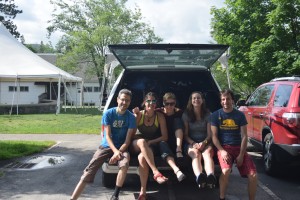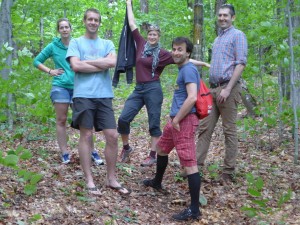Last month, a group of four McGlynn lab mates, myself included, attended a Gordon Research Conference for Catchment Science in Andover, New Hampshire. Just a couple days in to the week-long adventure, we realized the title “science camp” was much more fitting for the experience. Each day of the conference was filled with not only thought-provoking presentations, posters and science discussions, but ample time for recreation and socializing. And it was all set on the campus of a perfectly picturesque New England style boarding school, surrounded by hiking trails, swimming holes, and beautiful rolling hills. By the end of our trip we concluded Gordon conferences are a must-have on the list of regular science activities in our future careers. We did realize, however, there are several key steps for making the Gordon Conference a truly successful science camp.
Step 1. Get to the conference. It all started with a 16 hour drive north, through seven states, and way too many toll booths. We managed to safely and happily transport ourselves from Durham to Andover with seven bikes, camping gear, our own personal gear, and 4 poster tubes crammed into the back of our lab truck.
Here we are all loaded up and ready to hit the road! Left to right: Michael Rinderer, Kendra Kaiser, Lisa Angermann, Maggie Zimmer, Stefano Basso.
Step 2. The Student Seminar. Prior to the Gordon Conference, there is a two-day graduate student and post-doc seminar. The format for the conference and the seminar are practically the same – a few 20-30 minute talks each day that everyone attends, an afternoon poster session, and plenty of social time. This step is key as it allowed us an opportunity to meet our national and international cohort of catchment hydrologists before being thrown into the entire conference attendee group. I believe the connections that were made in those two days will carry over to interactions at future conferences and potentially be the foundation for future collaborations. On top of this, our Duke contingent managed to secure 3 of the 8 invited talk slots at the seminar, which added a level of excitement and nervousness for our group. And two of those talks were voted by their peers to be presented again at the actual conference. Woohoo!
Step 3. The Conference. Here comes the fun part. Picture this: Be greeted in the morning by four hand-selected-for-our-enjoyment presentations on the hottest topics in catchment hydrology. Follow that by an afternoon of free time, which usually involved some mix of conference-wide ultimate frisbee or soccer game (typically North America vs. The World), a group bike ride to the lake, or getting giddy over scribbles on a piece of paper with your long-time (or brand new) colleague. It gets better. Immediately after free time, we all cram into the poster hall for a few hours of beer sipping and poster wandering. This is when some of the best discussions occurred for me – I learned so much about my field during these poster sessions and got a lot of feedback during my poster presentation slot. And to end the evening, we enjoyed a handful more talks and debriefed over more beer. Yup. Four beautiful days of that.
Step 4. Field Trip. Alright, this last step is optional, but highly recommended to round out the experience: A field trip to one of the world’s most famous experimental forests! As it turns out, one of our fellow River Center PhD students is spending the summer doing field work at the Hubbard Brook Experimental Forest, so naturally we stopped over for a visit! Before heading back to Durham, we spent a day touring Watershed 1, learning about Hubbard Brook’s history, and experiencing Mirror Lake firsthand. I had spent two summers there myself, so this was a particularly special moment for me.
Here we are touring Hubbard Brook Experimental Forest’s Watershed 1. Left to right: Maggie Zimmer, David Dralle, Lisa Angermann, Stefano Basso, and Jake Hosen.
There are a few other sub-steps and nuances in this list, such as overheat in your dorm room at night, eat dessert at every meal, and struggle through the return drive home, but hopefully this blog post gives a glimpse at the wonders of science camp. Our lab group is extremely fortunate to have had the opportunity to attend this conference and we are all so grateful for the experience. I think we can all agree that it is weeks like this that can rejuvenate and re-motivate a weary graduate student.


